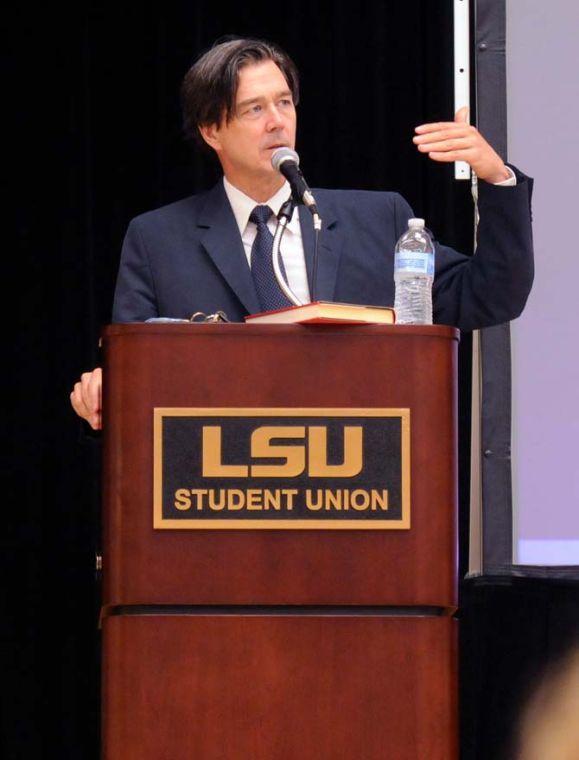Mark Hertsgaard, nationally-recognized writer and reporter, claimed there are three steps that University freshman can take to combat wetland erosion in an address to incoming Honors College students Wednesday.
Hertsgaard discussed how students can get involved with the serious problem Louisiana faces with the disappearance of its coastal wetlands. His book, “HOT: Living Through The Next Fifty Years On Earth,” is being implemented into the honors curriculum within the University, and Hertsgaard’s talk is part of an effort to educate students about the growing global warming issue.
The first thing Hertsgaard said students can do to combat the problem is simply acknowledge its existence. The next step is “just do something,” because any amount of action put into place does some good in helping the issue.
The final thing that Hertsgaard urged is to “do something with others.”
Hertsgaard explained that the current levee system in New Orleans is a one- to 200-year protective system, meaning the levee system and therefore the city itself can withstand a catastrophic event — such as another hurricane Katrina — once every 200 years.
However, with the disappearing land along the gulf coast, this time frame could shorten. It is possible New Orleans could only survive one major storm in a time frame less than 200 years.
Though this is a vast improvement from the pre-Katrina system, it is still not adequate, Hertsgaard said. With the disappearance of the Gulf Coast wetlands comes the dissipating effect the land has on blocking hurricanes from immediately hitting populated areas. Because of this, the city’s ability to survive higher category storms will drastically decrease in the next 50 years, he said.
To create change in the preservation of the eroding wetlands, Hertsgaard said students and people around the country must become politically active.
“We need to create enough of a political movement to change the policy making of this country,” Hertsgaard said.
Part of Hertsgaard’s goal in talking to University students is to educate the incoming class on the issue that will directly affect their future homes, as well as motivating young people to do something about it.
Hertsgaard said much of the rest of the country is unaware or unconcerned with the problem New Orleans and south Louisiana face. During Katrina, he said, the general question on Capitol Hill was why New Orleans should be reconstructed or saved in the first place.
But America needs New Orleans to be a city that works, he said.
Not only is New Orleans a port at the mouth of the biggest river in the country, but it’s also a center for rich and unique culture. Hertsgaard’s book discuses the topic in greater detail.
He said because the future is in the hands of young people, it is partially their responsibility to help preserve the future of a city as important as New Orleans and south Louisiana as a whole.
Writer advocates awareness, action against erosion
September 4, 2013
Nationally Recognized Author, Mark Hertsgaard, speaks to the freshman Honor students Wed. Sept. 4, 2013, about the importance of levee biulding, global warming, and perserving the wetlands.








